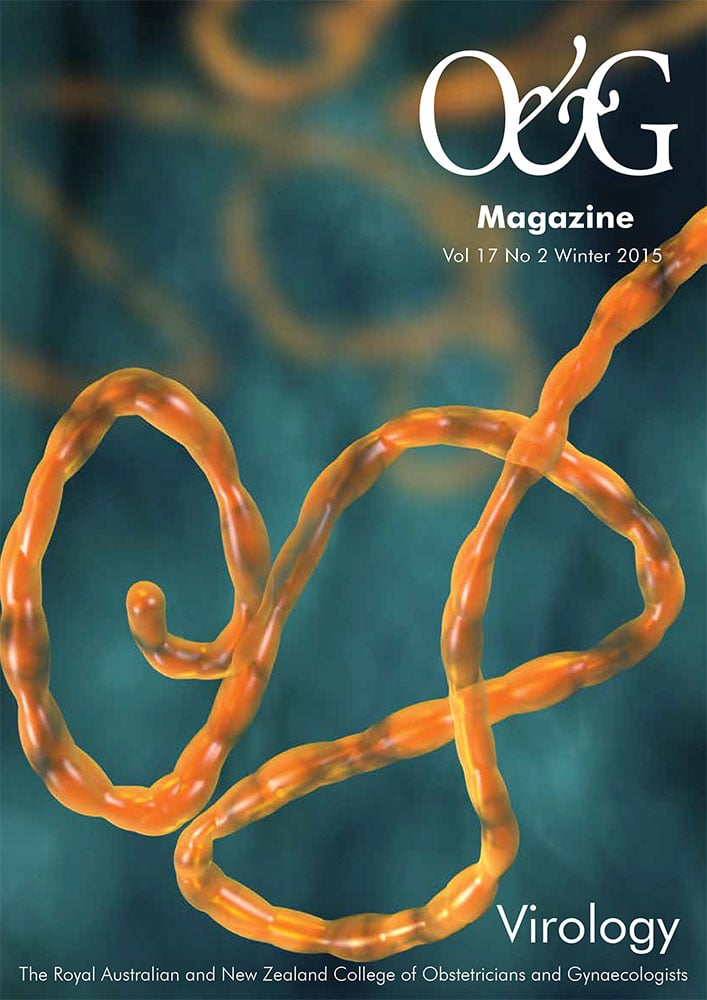It was very pleasing to see more than 2300 participants at the Joint RCOG/RANZCOG Event 2015, in Brisbane. Initial feedback has acclaimed the meeting as an outstanding success and many congratulations are owed to the principle organisers A/Prof Ted Weaver and Dr Clare Boothroyd. A full report on the Congress will run in the next issue of O&G Magazine, but some of the very many photos from the Congress are shown here to show the scale of the event.
There were many highlights of the meeting, including truly superb local and international keynote speakers. The all-encompassing message was we should have a strong evidence-base to clinical practice in women’s health, but – importantly – the best evidence is not always a randomised controlled trial.
FIGO 2021 Congress
The International Federation of Gynecology and Obstetrics (FIGO) has recently revised the process of nominations so that bids to host the Congress are made by host cities rather than member societies. As such, Melbourne and Sydney are submitting bids to host the FIGO 2021 Congress, with the College supporting both. Each city was visited by representatives of FIGO in early March 2015, along with others in the Asia-Oceania region bidding to host this prestigious meeting. The delegation will make a recommendation to the FIGO Executive at its meeting in May, and the final decision will be voted on at the FIGO 2015 Congress in Vancouver.
FIGO 2015 Congress
College members will no doubt be aware that the 2015 FIGO World Congress is to be held in Vancouver, Canada, 4–9 October 2015. In 2014, the College applied to host a society session within the Congress program and confirmation of acceptance has been recently received. Those attending the meeting in Vancouver are encouraged to attend the RANZCOG session on Monday, 5 October 2015, featuring presentations on perinatal mental health; lessons from practice in resource poor settings; and violence and other non-obstetric trauma in pregnancy.
Additionally, as part of the FIGO award program recognising women obstetrician gynaecologists, I am pleased to advise that Dr Mary Schramm is to receive this award at the 2015 FIGO World Congress for her immeasurable contribution over a 30-year period to the health of the women and babies of Fiji.
Training
Efforts to improve procedural training remain a key area of activity for the College. All acknowledge the changes in quantity of training brought about by many influences, including safe working hours, reduced utilisation of overseas experience and an increasing recourse to medical management of conditions that had previously required surgery. While it is easy to be critical without offering solutions, the College has determined a number of strategies to improve procedural training.
One key strategy, among the many that have the College’s focus, is the increased use of simulation. In March, the Council was very pleased to receive an excellent presentation from Dr Sarah Jansens and Dr Michael Beckman, Mater Health Services, with a suggested plan for a structured introduction of simulation across all training sites (for an overview of the role for simulation in training see p50). As a first step, Trainees and training institutions will be surveyed to explore what is currently available to Trainees at the various training sites.
The e-portfolio continues to progress with electronic logging of all training procedures planned for the 2016 training year. It is envisaged that, with the availability of detailed information on the specific procedures, their complexity and the quantum available to Trainees at any given site, hospital allocation of Trainees will be adjusted to capitalise on the best-available training opportunities.
Basic skills
While completion of a Basic Surgical Skills Workshop has been a compulsory requirement for Year 1 FRANZCOG Trainees for a number of years, the Education Strategy Committee has also recently approved the introduction of a Basic Obstetric Skills Workshop for Trainees. While recognising the increasing competition for selection onto the FRANZCOG Training Program, women’s health is no longer a core requirement of some medical school curricula and, as such, a need for early training in basic obstetric skills has been identified by the Committee and will be a compulsory requirement for Trainees commencing in the Training Program from 1 December 2016. This need has been balanced against the impost of requiring attendance by Trainees at yet another workshop.
FRANZCOG Training in resource-limited settings
The College recognises that placements in resource-limited settings can provide valuable training experience and the number of requests from Trainees wishing to undertake assignments in such settings continues to increase. As such, the Board has approved a guidelines document that outlines the steps and circumstances in which training in resource-limited settings might be credited towards Core or Advanced Training. Such training, if deemed suitable, could be approved as a substitute for the rural rotation for Trainees in the Core Training Program. The guidelines are available on the College website.
eLearning developments
The number of modules and resources that are available to Trainees and Fellows on CLIMATE continues to grow. In addition to the core CLIMATE modules and activities that support the FRANZCOG and Diploma curricula, the eLearning platform hosts webcast presentations from previous ASMs; online lectures; landmark clinical trial papers; subspecialty resources; Regional Committee links; revision course presentations; modules for research, training supervisors and clinical educators; and a pregnancy and alcohol online course, to name a few. I encourage you to explore the resources available to you on CLIMATE. You will need to log in using your user name and password. If you need to be reminded of these, use the Lost Password link.
Women’s health
The withdrawal of PGF2alpha by Pfizer from the Australian market has now proceeded. The College has been advised that pharmacies can readily obtain PGF2alpha manufactured overseas from pharmaceutical wholesalers using the Special Access Scheme Category A (life-saving medication).
Subscriptions
Fellow subscriptions will be unchanged, save for the necessary CPI increase. For the 2015–16 financial year, Fellows will retain the option of paying online, by post or using telephone banking. However, from 2016, the subscription will need to be renewed online, with an individual’s practice profile updated as part of the process. While the College is reluctant to impose a compulsory survey on Fellows and appreciates the burden of an additional requirement, it is extremely difficult to plan training and educational programs without substantive and up-to-date knowledge of the current clinical profile of our Fellows. This will occur in a manner similar to that undertaken by the regulatory body at the time of renewing medical registration and will be pre-populated one year to the next; however, it will specifically address the practice of our specialty.
Semi-retired Fellows
A Retired Fellow does not pay a subscription; however, the College recognises a number of Fellows reduce the size of their clinical practice as they approach retirement and find the subscription a major financial burden. The College recognises that these senior Fellows make major contributions in clinical teaching and administration in addition to their clinical work. Attempts to define semi-retired status by size of practice has proved difficult and the College has now made the Semi-retired Fellow membership category available to those who: are and have been actively practising as a Fellow of RANZCOG for at least 30 years and have an annual, pre-tax medical income of not more than AUD$60 000 (or the equivalent). Semi-retired Fellows pay half the annual subscription of a full Fellow and are required to submit an annual declaration regarding their eligibility for this membership category.
Selection
The FRANZCOG training selection process for New Zealand is well under way at the time of writing this report. The Australian process has also just commenced. Selection is an intensely competitive process, which must occur in a fair and transparent manner while striving to recruit the best-possible future specialists to our discipline.
A persistent issue with recent selection has been a recurring difficulty in translating current workplace performance into the selection score. There is widespread acceptance that the highly performing resident or unaccredited registrar is more likely to be a better Trainee and future specialist than the poor performer. Referee reports score almost all Trainees uniformly highly, regardless of what questions are posed or the scoring system used. In order to obtain meaningful hospital input into selecting the Trainees they will be asked to employ, the College will ask the hospitals to rank applicants for training who are working or have worked at their hospital. I urge all Fellows and Trainees to provide input into this process to ensure that the best-performing applicants are selected for entry into training in our specialty.
Social media
Timed to coincide with the Joint Congress, the College recently launched its Facebook page: www.facebook.com/ranzcog. RANZCOG will be regularly updating its page and entries and I encourage those who use Facebook to connect with the College through this medium.
Chief Executive Officer
The Board is very pleased to announce the appointment of Ms Alana Killen as the new CEO of RANZCOG. Alana comes to the College after approximately five years as CEO of the Australasian College of Emergency Medicine and is expected to commence at RANZCOG on 29 June 2015.






Leave a Reply